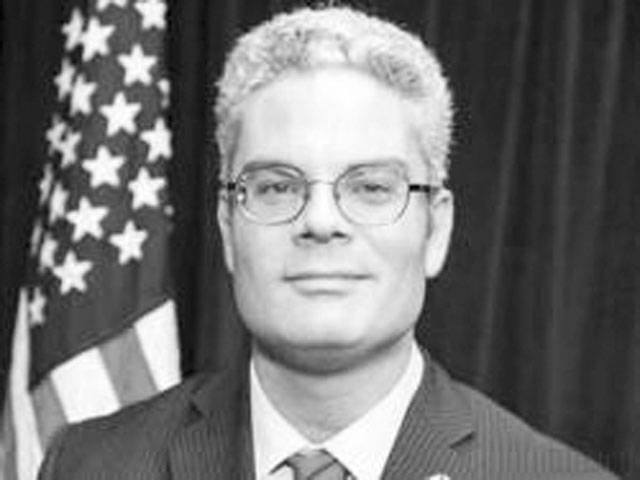LAHORE
US Consul General Zackary Heindreker has said that the United States is Pakistan’s largest trading partner, as bilateral trade between the two countries exceeded $5 billion during last fiscal year. The US is also one of the top sources of foreign direct investment to Pakistan, with $206.8 million in FY 2013.
While talking to the members of the All Pakistan Business Forum here at a dinner hosted in his honour, the US Consul General said that in last fiscal year, the United States accounted for 15.7 per cent of Pakistan’s exports, the most of any country, and $1.12 billion of its imports, he added.
The US consul general said that economic reforms require tough decisions, but it would help Pakistan overcome fiscal, energy and agriculture challenges. He said trade also has the potential to create jobs for the estimated 20 million Pakistanis entering the labour force in the next 10 years. He said that Pakistanis could reach their full potential when they have economic opportunities. He said that American companies were productive and progressive members of Pakistan’s society and economy.
“The United States has had diplomatic relations with Pakistan since its creation, and it again declares to invigorate ties with Pakistan to foster a deeper and comprehensive trade partnership, besides facilitating the concrete support in all fields ranging from energy to counterterrorism.”
“We look forward to working together with the Pakistani partners to strengthen commercial ties between our two countries. We will continue our work together to promote Pakistan’s socio-economic development.”
Zackary Heindreker observed that the US civilian assistance to Pakistan is focused on five priority areas including energy, economic growth, agriculture; community stabilization of restive areas; education; and health.
He said that in last five years the US disbursed over $4.38 billion in civilian assistance to Pakistan, including over $1 billion of humanitarian assistance following natural disasters, floods and conflict.
The US implements programs with Pakistani partners, including the government of Pakistan and civil society to increase local capacity and promote sustainability of efforts. The US contributions have added over 1,300MW to Pakistan’s electricity grid through infrastructure upgrades, rehabilitation and policy consultation. This promotes our mutual goal of a stable, secure, and prosperous Pakistan.
Zackary Heindreker said that the major US investments are concentrated in fast-moving consumer goods, construction, chemicals, energy, and communications.
Addressing the meeting, APBF President Ibrahim Qureshi observed that Pakistan has taken steps over the years to liberalize its trade and investment regimes. Highlighting the economic potential of Pakistan’s young, growing population, and the nation’s increasingly large and sophisticated domestic consumer market, the APBF President offered recommendations to help create a better business environment for US partner companies in Pakistan by identifying and addressing barriers to investment and growth in the country.
“The APBF is working hard in establishing the basic conditions necessary for robust commercial engagement between U.S. businesses and Pakistan,” said Ibrahim Qureshi. “Our meeting aims to highlight Pakistan’s potential, as our member companies see it. Beneath the headlines, the opportunities are real indeed.”
Ibrahim Qureshi stated that with hosts of recommendations, the APBF’s forum allows private sectors of both the countries to take part in bilateral high-level discussions on economic and trade issues.”
APBF Chairman Haroon Khawaja, on this occasion, stressed the need for enhancing private sector growth and investment through reestablishment of bilateral discussions of working groups on agriculture, economics and finance, energy, market access, and science and technology.
APBF Secretary General Ayesha M. Hamid thanked the US consul general and reaffirmed APBF commitment to establishing an effective bridge between the US and Pakistani economies for the benefit of all.
She called for the US-Pakistan bilateral investment treaty, taking the private sector onboard, which would help Pakistan create a stable, predictable investment climate that will be attractive to many investors.
Thursday, April 18, 2024
Reforms to help Pakistan overcome challenges: US

Mehwish Hayat says she would like to work with Aamir Khan
9:59 PM | April 18, 2024
'That'll be awesome,' Rohit Sharma on idea of Pakistan vs India Test series
9:17 PM | April 18, 2024
Turkiye commends Pakistan's efforts in fostering regional peace
9:03 PM | April 18, 2024
CM Maryam's security squad hits biker to death in Narowal
9:02 PM | April 18, 2024
Hafiz Naeemur Rehman sworn in as new emir of Jamaat-e-Islami
8:54 PM | April 18, 2024
Hepatitis Challenge
April 18, 2024
IMF Predictions
April 18, 2024
Wheat War
April 18, 2024
Rail Revival
April 17, 2024
Addressing Climate Change
April 17, 2024
Justice denied
April 18, 2024
AI dilemmas unveiled
April 18, 2024
Tax tangle
April 18, 2024
Workforce inequality
April 17, 2024
New partnerships
April 17, 2024
ePaper - Nawaiwaqt
Advertisement
Nawaiwaqt Group | Copyright © 2024





